【新课标】Unit 12 What did you do last weekend Section A (Grammar Focus—3c)课件(34张PPT)
文档属性
| 名称 | 【新课标】Unit 12 What did you do last weekend Section A (Grammar Focus—3c)课件(34张PPT) |
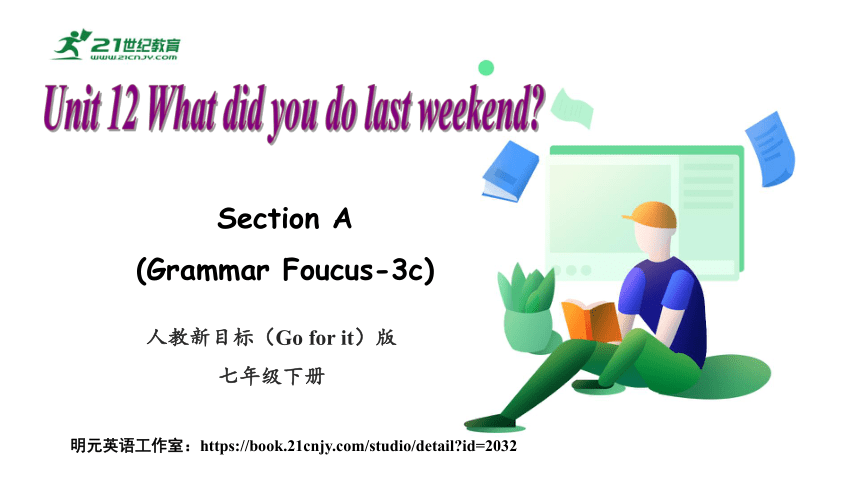
|
|
| 格式 | pptx | ||
| 文件大小 | 6.7MB | ||
| 资源类型 | 试卷 | ||
| 版本资源 | 人教新目标(Go for it)版 | ||
| 科目 | 英语 | ||
| 更新时间 | 2023-06-11 20:23:59 | ||
图片预览

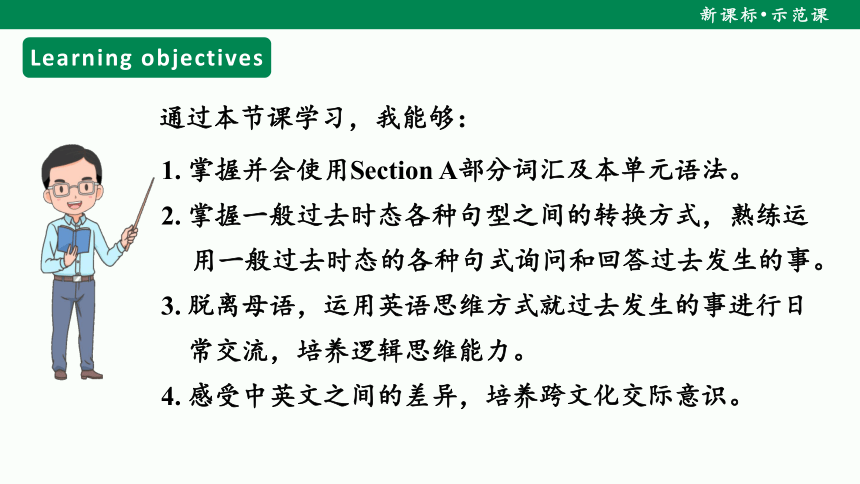
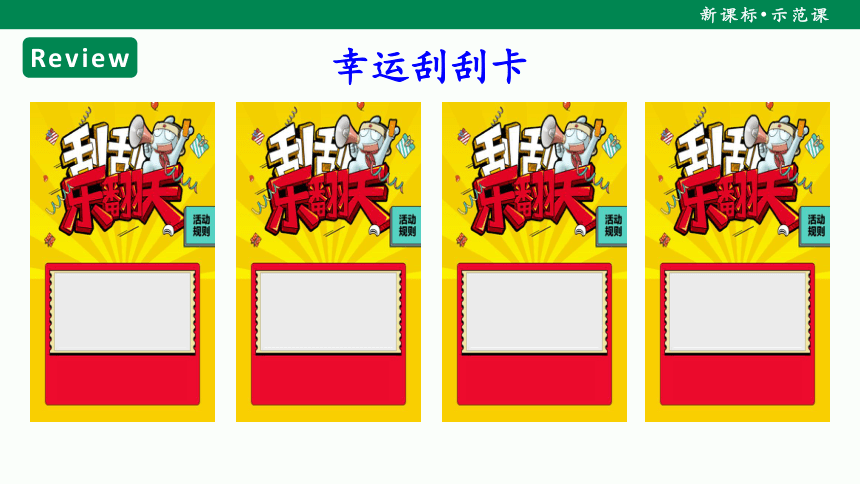
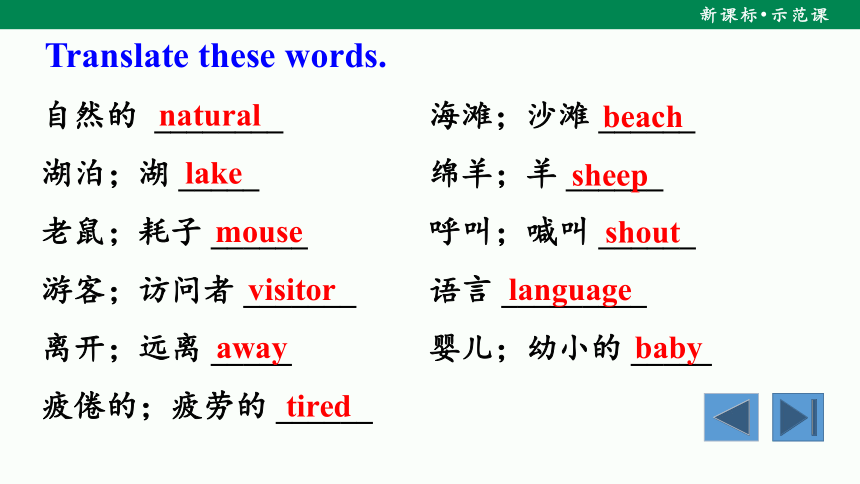
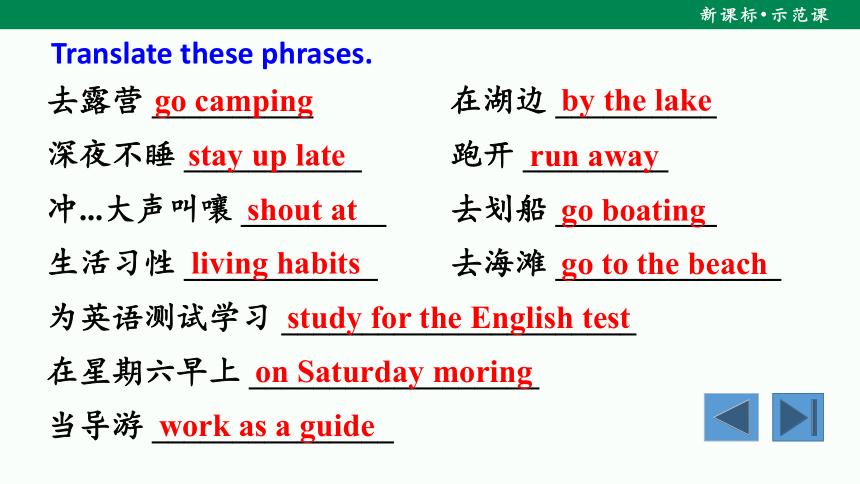
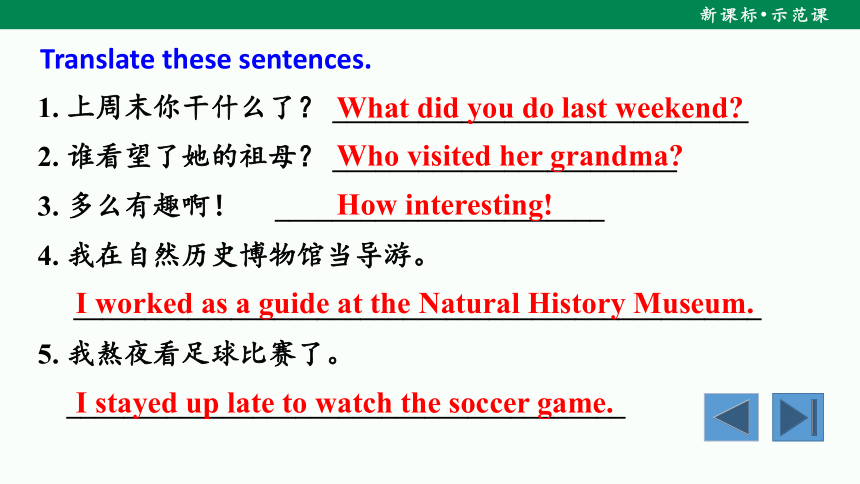
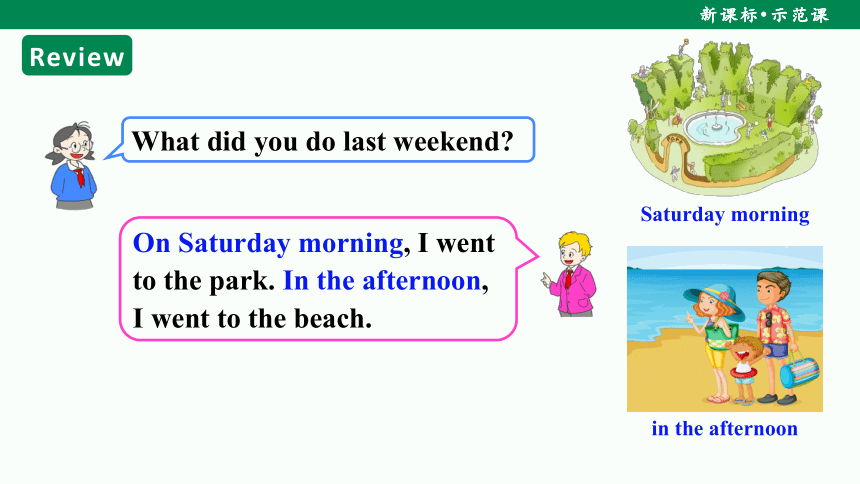
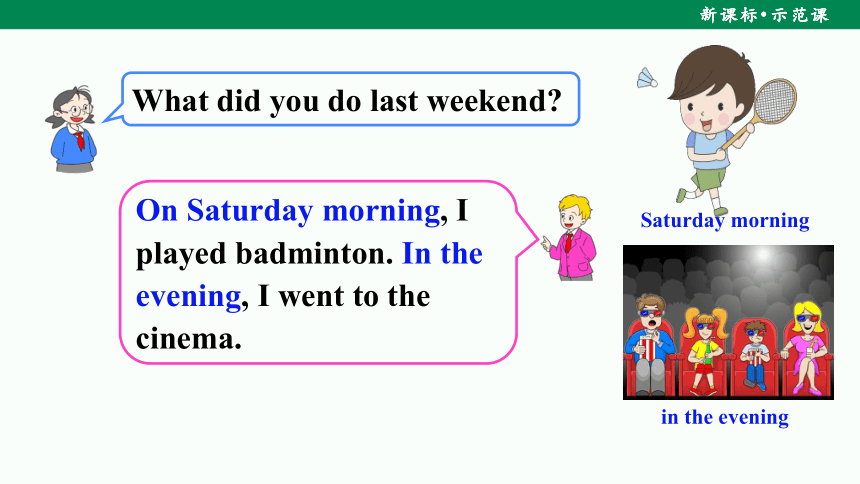
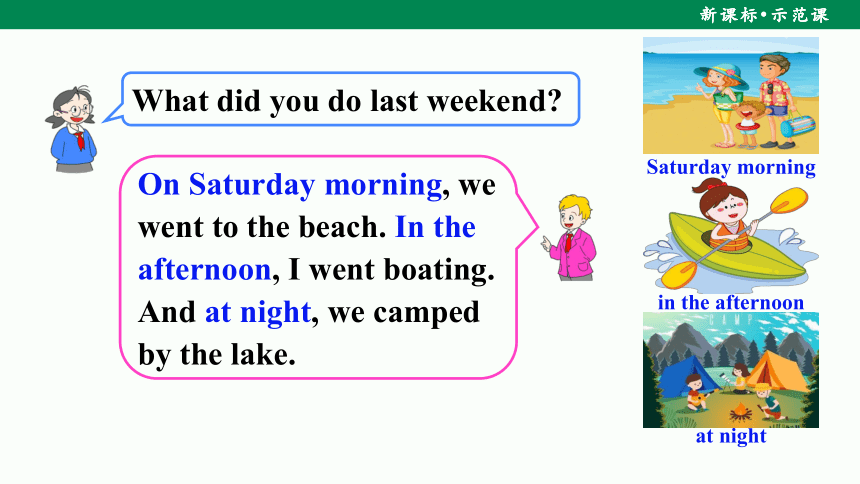
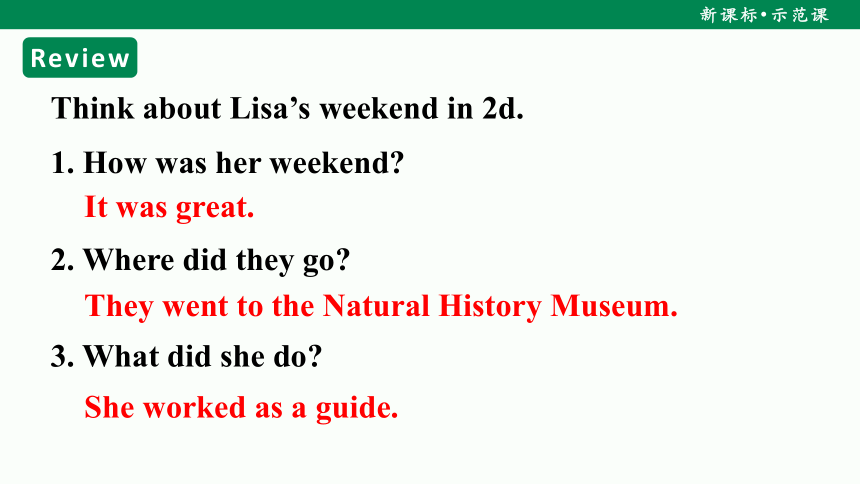
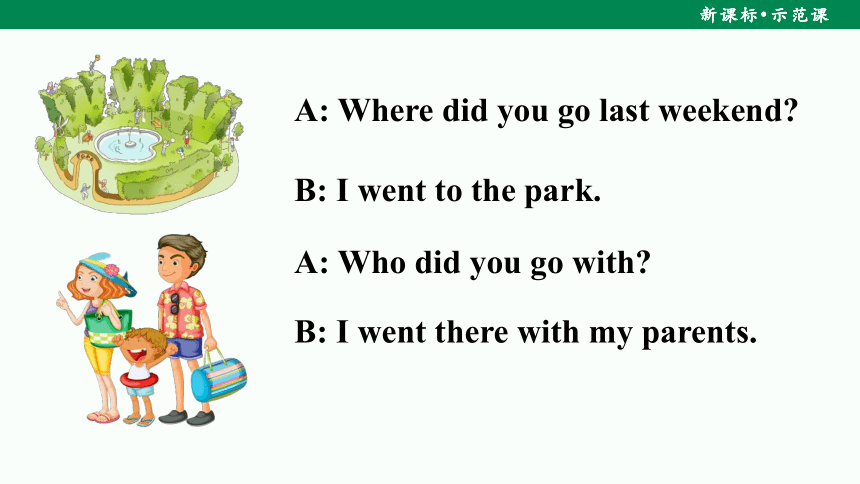
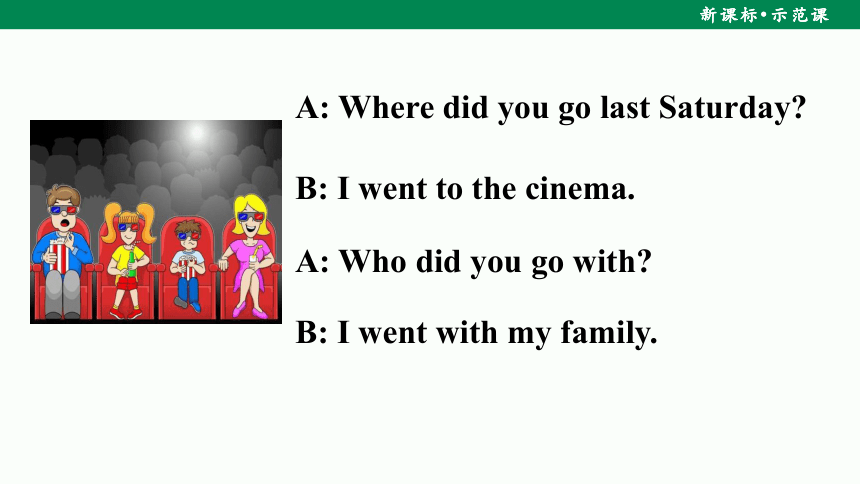
文档简介
(共34张PPT)
人教新目标(Go for it)版
七年级下册
Unit 12 What did you do last weekend
明元英语工作室:https://book.21cnjy.com/studio/detail id=2032
Section A
(Grammar Foucus-3c)
通过本节课学习,我能够:
1. 掌握并会使用Section A部分词汇及本单元语法。
2. 掌握一般过去时态各种句型之间的转换方式,熟练运
用一般过去时态的各种句式询问和回答过去发生的事。
3. 脱离母语,运用英语思维方式就过去发生的事进行日
常交流,培养逻辑思维能力。
4. 感受中英文之间的差异,培养跨文化交际意识。
幸运刮刮卡
5分试题
3分试题
幸运2分
7分试题
Translate these words.
自然的 ________ 海滩;沙滩 ______
湖泊;湖 _____ 绵羊;羊 ______
老鼠;耗子 ______ 呼叫;喊叫 ______
游客;访问者 _______ 语言 _________
离开;远离 _____ 婴儿;幼小的 _____
疲倦的;疲劳的 ______
natural
mouse
beach
sheep
shout
visitor
lake
language
away
baby
tired
Translate these phrases.
去露营 __________ 在湖边 __________
深夜不睡 ___________ 跑开 _________
冲...大声叫嚷 _________ 去划船 __________
生活习性 ____________ 去海滩 ______________
为英语测试学习 ______________________
在星期六早上 __________________
当导游 _______________
by the lake
go camping
work as a guide
stay up late
living habits
run away
study for the English test
shout at
go boating
on Saturday moring
go to the beach
Translate these sentences.
1. 上周末你干什么了? _____________________________
2. 谁看望了她的祖母? ________________________
3. 多么有趣啊! _______________________
4. 我在自然历史博物馆当导游。
________________________________________________
5. 我熬夜看足球比赛了。
_______________________________________
What did you do last weekend
How interesting!
Who visited her grandma
I worked as a guide at the Natural History Museum.
I stayed up late to watch the soccer game.
Review
On Saturday morning, I went to the park. In the afternoon, I went to the beach.
What did you do last weekend
Saturday morning
in the afternoon
On Saturday morning, I played badminton. In the evening, I went to the cinema.
What did you do last weekend
Saturday morning
in the evening
On Saturday morning, we went to the beach. In the afternoon, I went boating. And at night, we camped by the lake.
What did you do last weekend
Saturday morning
in the afternoon
at night
Think about Lisa’s weekend in 2d.
1. How was her weekend
2. Where did they go
3. What did she do
It was great.
They went to the Natural History Museum.
She worked as a guide.
A: Where did you go last weekend
B: I went to the park.
B: I went there with my parents.
A: Who did you go with
A: Where did you go last Saturday
B: I went to the cinema.
B: I went with my family.
A: Who did you go with
A: Where did you go last weekend
B: I went to the countryside.
A: Who did you go with
B: I went with my brother.
B: We made zongzi with our grandma.
A: What did you do there
New words
(pl. mice /ma s/)
away
run away
mouse
baby
shout
shout at ...
离开;远离
跑开
老鼠;耗子
幼小的
呼叫;喊叫
冲...大声叫嚷
语言
adv.
n.
adj.
interj.
v.
n.
woof
language
/w f/
/ l ɡw d /
/ a t/
/ be bi/
/ma s/
/ we /
婴儿
n.
(狗叫声)汪汪
Grammar Focus
上周末你(们)做了什么?
What did you do last weekend
我做家庭作业了。
/我们去划船了。
I did my homework.
/We went boating.
谁看望了她的奶奶?
Who visited her grandma
贝姬看望了(她的奶奶)。
Becky did.
上周末她去哪里了?
Where did she go last weekend
她去一家农场了。
She went to a farm.
她和谁一起去的?
Who did she go with
她与她的同班同学一起去的
She went with her classmates.
Translate these sentences
1. 陈述句变为一般疑问句
一般过去式(II)
(1)移动词语的位置:当句中有was, were, could, would, should
等词时,将它们移到句首。
Grammar
My weekend was very great.
Was your weekend very great
一般过去时不同的句式变化:
2. 肯定陈述句变为否定陈述句
(2)加助动词did:谓语是实义动词时,在主语之前加did,动
词还原为原形。
(1)当句中含有情态动词could, would, should等,或句中含有连系动词was, were时,可直接在它们后面加not构成否定句。
He went to a farm last weekend.
Did he go to a farm last weekend
(2)当句中的谓语动词是实义动词时,在该动词之前加did not
/didn’t,动词还原为原形,构成否定句。
He could swim last year.
He couldn’t swim last year.
I was at home yesterday.
I wasn’t at home yesterday.
They went to the village last month.
They didn’t go to the village last month.
3. 陈述句变为特殊疑问句
(1)确定疑问词:人who /whom,物what,地点where,时间when /what time,原因why,长度how long,距离how far等。
They went to the countryside last weekend.
When ...
He went camping by the lake.
Where ...
(2)疑问词 + 一般疑问句,再删除划线部分。
They went to the countryside last weekend.
When ...
Did they go to the countryside last weekend
When did they go to the countryside
3a
Fill in the blanks with who, what, when, where or how.
A: ______ did you do last weekend
B: I played badminton on Saturday.
A: Sounds fun! _____ did you play with
B: I played with my father. He’s really good!
What
Who
2. A: ______ was your weekend
B: It was great! I had so much fun!
A: _______ did you go
B: The weather was beautiful, so I went to the beach with my
parents.
3. A: ______ did Jim lose
B: He lost his keys. He often loses things.
A: That’s too bad. ______ did he lose them
B: I heard it was yesterday.
How
Where
What
When
3b
Complete the passage with the correct forms of the words in the box.
say be climb see run away
A family of mice were in the kitchen on Saturday morning when they _____ a big cat. Baby Mouse _______ afraid and ________ onto his father’s back. Father Mouse shouted at the cat, “Woof, woof! ” The cat quickly _________. “Wow, Dad, you’re good!” ______ Baby Mouse. “Well, son, that’s why it’s important to learn a second language,” answered Father Mouse.
saw
was
climbed
ran away
said
3c
Think of two things you did last weekend. Draw pictures of them. Your classmates guess what you did.
A: You went to the
mountains!
B: No.
C: ...
1. Father Mouse shouted at the cat, “Woof, woof!”
shout
v. 呼叫;喊叫
n. 呼喊;喊叫声
There is no need to shout. 没必要喊叫。
I heard a distant shout. 我听到了远处的一声喊叫。
【辨析】shout at 与shout to
shout at 意为“冲...大声叫嚷;吼(非善意)”。
shout to 意为“对...大声喊叫(无恶意)”。
Shouting to me is OK, but shouting at me isn’t OK.
向我呼喊可以,但冲我大喊大叫不行。
2. ...that’s why it’s important to learn a second language.
(1) That’s why ...意为“那就是为什么......;那就是...的原因”,
此处why引导表语从句。
That’s why he didn’t come. 那就是他为什么没有来的原因。
(2) a second language 意为“第二语言”。
English is a useful language. It is often used as a second language. 英语是一门有用的语言,它常被用作第二语言。
Section A (Grammar Focus-3c)
Important words:
away, mouse, baby, shout, woof, language
Important phrases:
run away, shout at ...
Grammar:
一般过去时
1. Don’t ______ (喊叫) at the old. It’s impolite(不礼貌的).
2. Her aunt had a lovely _____ (婴儿).
3. What _________ (语言) does your pen pal speak
4. The bank is five kilometers _____ (远离) from here.
5. There is a small _______ (老鼠) under the bed.
shout
baby
language
away
mouse
Ⅰ. 根据句意及汉语提示完成单词。
1. Helen washed her clothes yesterday afternoon.
______ ____ Helen ____ yesterday afternoon
2. Mike cleaned the room with Tom this morning.
_____ ________ the room with Tom this morning
3. They went to the village last month.
_______ _____ they go last month
What did do
Who cleaned
Where did
Ⅱ. 对下列句子中的划线部分提问,每空一词。
4. Susan joined the club two weeks ago.
______ _____ Susan join the club
5. Our school trip was great.
_____ ______ your school trip
6. Tom went to Beijing by plane.
______ _____ Tom go to Beijing
When did
How was
How did
完成配套练习册
Preview Section B (1a—1d)
All things are difficult
before they are easy.
凡事必先难后易。
与君共勉
THANK
21世纪教育网(www.21cnjy.com)
中小学教育资源网站
明元英语工作室:
https://book.21cnjy.com/studio/detail id=2032
WELCOME TO
人教新目标(Go for it)版
七年级下册
Unit 12 What did you do last weekend
明元英语工作室:https://book.21cnjy.com/studio/detail id=2032
Section A
(Grammar Foucus-3c)
通过本节课学习,我能够:
1. 掌握并会使用Section A部分词汇及本单元语法。
2. 掌握一般过去时态各种句型之间的转换方式,熟练运
用一般过去时态的各种句式询问和回答过去发生的事。
3. 脱离母语,运用英语思维方式就过去发生的事进行日
常交流,培养逻辑思维能力。
4. 感受中英文之间的差异,培养跨文化交际意识。
幸运刮刮卡
5分试题
3分试题
幸运2分
7分试题
Translate these words.
自然的 ________ 海滩;沙滩 ______
湖泊;湖 _____ 绵羊;羊 ______
老鼠;耗子 ______ 呼叫;喊叫 ______
游客;访问者 _______ 语言 _________
离开;远离 _____ 婴儿;幼小的 _____
疲倦的;疲劳的 ______
natural
mouse
beach
sheep
shout
visitor
lake
language
away
baby
tired
Translate these phrases.
去露营 __________ 在湖边 __________
深夜不睡 ___________ 跑开 _________
冲...大声叫嚷 _________ 去划船 __________
生活习性 ____________ 去海滩 ______________
为英语测试学习 ______________________
在星期六早上 __________________
当导游 _______________
by the lake
go camping
work as a guide
stay up late
living habits
run away
study for the English test
shout at
go boating
on Saturday moring
go to the beach
Translate these sentences.
1. 上周末你干什么了? _____________________________
2. 谁看望了她的祖母? ________________________
3. 多么有趣啊! _______________________
4. 我在自然历史博物馆当导游。
________________________________________________
5. 我熬夜看足球比赛了。
_______________________________________
What did you do last weekend
How interesting!
Who visited her grandma
I worked as a guide at the Natural History Museum.
I stayed up late to watch the soccer game.
Review
On Saturday morning, I went to the park. In the afternoon, I went to the beach.
What did you do last weekend
Saturday morning
in the afternoon
On Saturday morning, I played badminton. In the evening, I went to the cinema.
What did you do last weekend
Saturday morning
in the evening
On Saturday morning, we went to the beach. In the afternoon, I went boating. And at night, we camped by the lake.
What did you do last weekend
Saturday morning
in the afternoon
at night
Think about Lisa’s weekend in 2d.
1. How was her weekend
2. Where did they go
3. What did she do
It was great.
They went to the Natural History Museum.
She worked as a guide.
A: Where did you go last weekend
B: I went to the park.
B: I went there with my parents.
A: Who did you go with
A: Where did you go last Saturday
B: I went to the cinema.
B: I went with my family.
A: Who did you go with
A: Where did you go last weekend
B: I went to the countryside.
A: Who did you go with
B: I went with my brother.
B: We made zongzi with our grandma.
A: What did you do there
New words
(pl. mice /ma s/)
away
run away
mouse
baby
shout
shout at ...
离开;远离
跑开
老鼠;耗子
幼小的
呼叫;喊叫
冲...大声叫嚷
语言
adv.
n.
adj.
interj.
v.
n.
woof
language
/w f/
/ l ɡw d /
/ a t/
/ be bi/
/ma s/
/ we /
婴儿
n.
(狗叫声)汪汪
Grammar Focus
上周末你(们)做了什么?
What did you do last weekend
我做家庭作业了。
/我们去划船了。
I did my homework.
/We went boating.
谁看望了她的奶奶?
Who visited her grandma
贝姬看望了(她的奶奶)。
Becky did.
上周末她去哪里了?
Where did she go last weekend
她去一家农场了。
She went to a farm.
她和谁一起去的?
Who did she go with
她与她的同班同学一起去的
She went with her classmates.
Translate these sentences
1. 陈述句变为一般疑问句
一般过去式(II)
(1)移动词语的位置:当句中有was, were, could, would, should
等词时,将它们移到句首。
Grammar
My weekend was very great.
Was your weekend very great
一般过去时不同的句式变化:
2. 肯定陈述句变为否定陈述句
(2)加助动词did:谓语是实义动词时,在主语之前加did,动
词还原为原形。
(1)当句中含有情态动词could, would, should等,或句中含有连系动词was, were时,可直接在它们后面加not构成否定句。
He went to a farm last weekend.
Did he go to a farm last weekend
(2)当句中的谓语动词是实义动词时,在该动词之前加did not
/didn’t,动词还原为原形,构成否定句。
He could swim last year.
He couldn’t swim last year.
I was at home yesterday.
I wasn’t at home yesterday.
They went to the village last month.
They didn’t go to the village last month.
3. 陈述句变为特殊疑问句
(1)确定疑问词:人who /whom,物what,地点where,时间when /what time,原因why,长度how long,距离how far等。
They went to the countryside last weekend.
When ...
He went camping by the lake.
Where ...
(2)疑问词 + 一般疑问句,再删除划线部分。
They went to the countryside last weekend.
When ...
Did they go to the countryside last weekend
When did they go to the countryside
3a
Fill in the blanks with who, what, when, where or how.
A: ______ did you do last weekend
B: I played badminton on Saturday.
A: Sounds fun! _____ did you play with
B: I played with my father. He’s really good!
What
Who
2. A: ______ was your weekend
B: It was great! I had so much fun!
A: _______ did you go
B: The weather was beautiful, so I went to the beach with my
parents.
3. A: ______ did Jim lose
B: He lost his keys. He often loses things.
A: That’s too bad. ______ did he lose them
B: I heard it was yesterday.
How
Where
What
When
3b
Complete the passage with the correct forms of the words in the box.
say be climb see run away
A family of mice were in the kitchen on Saturday morning when they _____ a big cat. Baby Mouse _______ afraid and ________ onto his father’s back. Father Mouse shouted at the cat, “Woof, woof! ” The cat quickly _________. “Wow, Dad, you’re good!” ______ Baby Mouse. “Well, son, that’s why it’s important to learn a second language,” answered Father Mouse.
saw
was
climbed
ran away
said
3c
Think of two things you did last weekend. Draw pictures of them. Your classmates guess what you did.
A: You went to the
mountains!
B: No.
C: ...
1. Father Mouse shouted at the cat, “Woof, woof!”
shout
v. 呼叫;喊叫
n. 呼喊;喊叫声
There is no need to shout. 没必要喊叫。
I heard a distant shout. 我听到了远处的一声喊叫。
【辨析】shout at 与shout to
shout at 意为“冲...大声叫嚷;吼(非善意)”。
shout to 意为“对...大声喊叫(无恶意)”。
Shouting to me is OK, but shouting at me isn’t OK.
向我呼喊可以,但冲我大喊大叫不行。
2. ...that’s why it’s important to learn a second language.
(1) That’s why ...意为“那就是为什么......;那就是...的原因”,
此处why引导表语从句。
That’s why he didn’t come. 那就是他为什么没有来的原因。
(2) a second language 意为“第二语言”。
English is a useful language. It is often used as a second language. 英语是一门有用的语言,它常被用作第二语言。
Section A (Grammar Focus-3c)
Important words:
away, mouse, baby, shout, woof, language
Important phrases:
run away, shout at ...
Grammar:
一般过去时
1. Don’t ______ (喊叫) at the old. It’s impolite(不礼貌的).
2. Her aunt had a lovely _____ (婴儿).
3. What _________ (语言) does your pen pal speak
4. The bank is five kilometers _____ (远离) from here.
5. There is a small _______ (老鼠) under the bed.
shout
baby
language
away
mouse
Ⅰ. 根据句意及汉语提示完成单词。
1. Helen washed her clothes yesterday afternoon.
______ ____ Helen ____ yesterday afternoon
2. Mike cleaned the room with Tom this morning.
_____ ________ the room with Tom this morning
3. They went to the village last month.
_______ _____ they go last month
What did do
Who cleaned
Where did
Ⅱ. 对下列句子中的划线部分提问,每空一词。
4. Susan joined the club two weeks ago.
______ _____ Susan join the club
5. Our school trip was great.
_____ ______ your school trip
6. Tom went to Beijing by plane.
______ _____ Tom go to Beijing
When did
How was
How did
完成配套练习册
Preview Section B (1a—1d)
All things are difficult
before they are easy.
凡事必先难后易。
与君共勉
THANK
21世纪教育网(www.21cnjy.com)
中小学教育资源网站
明元英语工作室:
https://book.21cnjy.com/studio/detail id=2032
WELCOME TO
同课章节目录
- Unit 1 Can you play the guitar?
- Section A
- Section B
- Unit 2 What time do you go to school?
- Section A
- Section B
- Unit 3 How do you get to school?
- Section A
- Section B
- Unit 4 Don't eat in class.
- Section A
- Section B
- Unit 5 Why do you like pandas?
- Section A
- Section B
- Unit 6 I'm watching TV.
- Section A
- Section B
- Review of Units 1-6
- Unit 7 It's raining!
- Section A
- Section B
- Unit 8 Is there a post office near here?
- Section A
- Section B
- Unit 9 What does he look like?
- Section A
- Section B
- Unit 10 I'd like some noodles.
- Section A
- Section B
- Unit 11 How was your school trip?
- Section A
- Section B
- Unit 12 What did you do last weekend?
- Section A
- Section B
